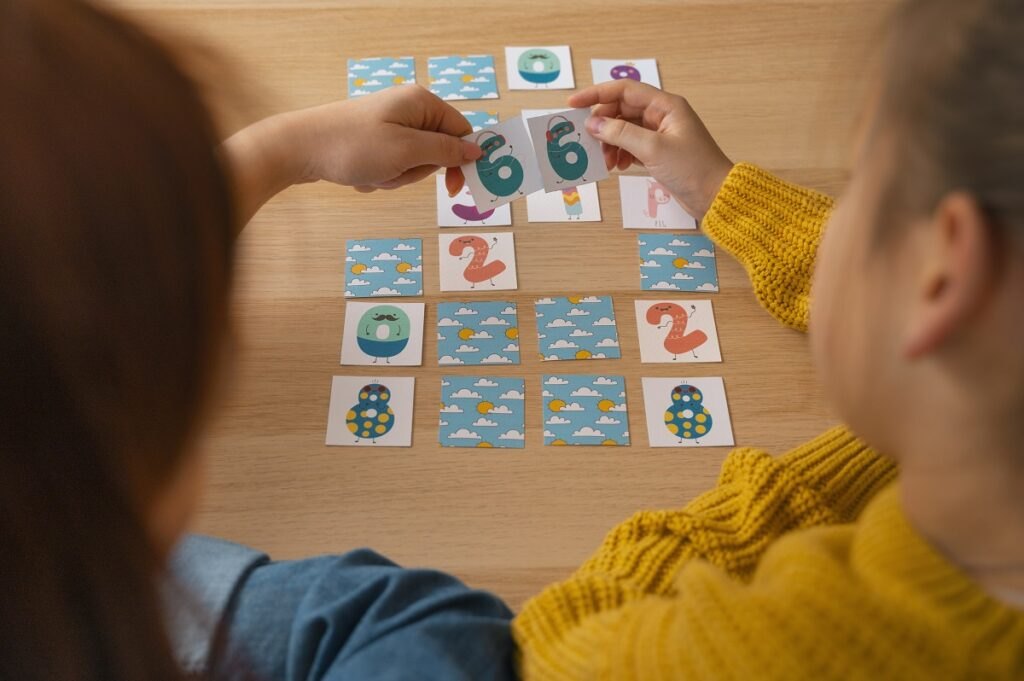We are aware that developing memory in our children is extremely important. It is a skill that opens doors to success in learning and everyday life. However, it is worth knowing that memory development occurs in stages, and each child goes through different phases in the process of perfecting this skill. Today, we will take a look at these stages so that we can better understand and support the memory development of our little ones.
Stages of memory development in children.
From the first months of a child’s life to school age, memory evolves and becomes increasingly advanced. Today, I would like to invite you to discover the stages of memory development in children so that you can better understand this remarkable process.
Stage 1: Sensory memory.
In the first months of a child’s life, memory is primarily based on sensory stimuli. The child remembers sounds, smells, tastes, and touches that they experience in their environment. We often see how our infants react with a smile or interest to familiar sounds or faces. This is the first step in memory development, which serves as a foundation for the subsequent stages. Sensory memory helps in forming early emotional bonds and recognizing close individuals.
How to support the development of sensory memory?
- Encourage exploration of different senses, for example, through play with various textures, sounds, and smells.
- Spend time cuddling, singing, and reading to our little ones to strengthen their auditory memory.
Stage 2: Short-term memory.
As the child grows, short-term memory also develops. This is a type of memory that allows for storing information for a short period, such as a few minutes. Preschool children often memorize short poems, riddles, or instructions.
How to support the development of short-term memory?
- Use repetition, for example, remind our child several times what they should do before leaving the house.
- Play games that require remembering sequences, such as “Simon says” or “Guess what’s missing.”
Stage 3: Long-term memory.
Long-term memory is the stage in which the child stores information for a longer period. This is a crucial stage for learning, as this is where important processes of memorization and knowledge retention occur.
How to support the development of long-term memory?
-
- Read books and tell stories that stimulate the imagination and the child’s emotions.
.
- Let’s make it easier to repeat information, for example by creating associations or using different senses during learning.
Stage 4: Semantic Memory.
As the child grows, semantic memory also develops, which is the ability to remember meanings, concepts, and facts. School-aged children begin to learn numbers, letters, geographical names, and many other pieces of information that are stored in their semantic memory.
How to support the development of semantic memory?
- Let’s use various learning techniques, such as notes, colorful pictures, songs, and movement, which will help reinforce information in memory.
- Give the child the opportunity to ask questions and talk about various topics to develop their ability to remember facts and concepts.
How to develop memory in a child.
Effective ways to stimulate memory in the youngest.
Playing with riddles and puzzles.
Riddles and puzzles are great tools for stimulating memory and logical thinking in children. You can solve puzzles, guessing games, and riddles together, using available materials or creating your own. This not only develops memory but also teaches perseverance and creative thinking.
Keeping conversations about daily events.
Daily conversations with the child about what happened during the day help them practice episodic memory. Encourage the little one to talk about their experiences, ask about details, and help them remember the sequence of events. This is an excellent exercise that develops both memory and the ability to express oneself.
Creating stories.
Encourage the child to create their own stories. They can be short, simple tales about favorite characters or animals. Stories created together help practice memory, as the child must remember subsequent events and arrange them logically. This also develops creativity and imagination.
Memory games.
The previously mentioned memory games owe, such as “Memory,” are not only fun but also very effective in developing memory in children. You can also use other variants of memory games, such as guessing sound sequences, arranging picture sequences, or finding hidden objects. These games engage the child’s mind, teaching concentration and memorization.
Interactive learning.
Using different senses in the learning process can yield excellent results. During learning letters, numbers, or shapes, we can use colorful cards, playdough, and even songs. Let the child touch, see, and hear the information, which will help with better memorization.
Mnemonics.
Mnemonics are memory techniques that can be very helpful for children in developing memory. For example, you can teach your child to create rhymes where information is linked to the sound of words. Another technique is creating associations that aid in memorization. Give the child the freedom to use their imagination and create their own mnemonics.
Time to relax.
Let’s not forget about rest. During sleep, our brain processes information and goes through memory consolidation processes. Ensure that our little ones get enough sleep so they can reach their cognitive potential.
Memory games for children.
Memory games are an excellent way to stimulate the mind and develop concentration in little ones.
Memory.
One of the classic memory games is “Memory.” It involves discovering and remembering pairs of pictures hidden on cards. You can prepare your own cards with favorite characters from cartoons, animals, or objects that are dear to your child. Playing “Memory” not only strengthens memory but also develops observation skills and the ability to focus attention.
Repeat after me.
This game requires the child to listen carefully and repeat sequences of sounds or words. You can start with simple sequences and then gradually increase their length. It’s a great fun that develops not only memory but also listening skills and concentration.
Hidden objects.
This game involves hiding objects under various cups or cloths, and then guessing where the sought-after object is located. You can use different items, such as blocks, toys, or even favorite treats. The child will need to focus on the location where the items are hidden and remember where those they have already discovered were placed.
Series of pictures.
Cut out or draw various pictures on pieces of paper and arrange them in front of the child. Give them a moment to memorize what pictures they see. Then, turn the papers upside down and let the child uncover them one by one, trying to arrange the series as they saw it at the beginning. This is a great game that will help your little one develop observational skills and visual memory.
Guess what disappeared?
This is a simple and fun game that you can play anywhere – at home, in the garden, or on a trip. Show your child several different objects, such as toys, fruits, or colorful blocks. Let them focus on these items for a moment, then close the little one’s eyes and take one of the objects away. Which one was it? Your child will surely enjoy trying to guess!
Guessing game.
You will need several different objects, such as a ball, a stuffed bear, a plastic spoon, etc. Give the child a moment to familiarize themselves with the items. Then, put a blindfold on them. Now your little one will try to guess which object they are holding based on verbal clues. This is an excellent game for playing together that will happily spend time and exercise auditory memory.
Remember and recreate.
This game requires a bit more preparation, but it is definitely worth it! Prepare several objects or toys, arrange them in a specific way, and let the child memorize it for a moment. Then, cover the items with a blanket or a large cloth. Your little one now has to accurately recreate the arrangement of the items. This is a great exercise for memory and concentration!
What are the benefits of memory games for children?
- First of all, they help develop logical thinking skills. Our little ones need to focus on details, remember images, and find matching pairs. This requires a certain level of analysis and reasoning, which in turn strengthens their minds and prepares them for further learning.
- Another advantage of memory games is developing perceptiveness. Children need to pay attention to details and differences between pictures, which helps them shape their observation skills. This is a wonderful skill that will be useful in their daily lives, aiding in problem-solving and coping with new situations.
Remember that memory games should be tailored to your child’s age and abilities. Initially, you can start with simpler variants and then gradually introduce greater challenges. The most important thing is that the game is enjoyable for the child and encourages active participation.
Memory development is not only a valuable gift but also a skill that a child can use throughout their life. Therefore, it is worth investing time and attention in developing it from an early age. Keep this in mind and embark on the journey to enhance your children’s memory!


